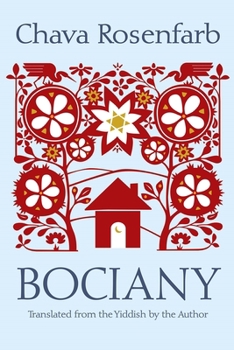Book Overview
In Bociany, Rosenfarb offers completely absorbing portrayals of Jews and Christians from several walks of life in the shtetl. Her primary characters are the scribe's widow Hindele, her son Yacov, the chalk vendor Yossele Abedale, and his daughter Binele. Jewish relations with neighboring Catholics are generally civil, if complicated. Despite living next door to a convent, Hindele finds the nuns' behavior implacably alien.
Format:Hardcover
Language:English
ISBN:0815605765
ISBN13:9780815605768
Release Date:January 2000
Publisher:Syracuse University Press
Length:440 Pages
Weight:1.66 lbs.
Dimensions:1.2" x 6.3" x 9.3"
Customer Reviews
2 ratings
A literary gem
Published by Thriftbooks.com User , 23 years ago
It is amazing that as someone who has lived the story ( I am a 91 yeer old survivor from Lodz , Poland) I could be so fascinated with all the characters. I can truly attest to the fact that this author has captured the authentic spirit of the time, the tensions, tragedies and joys of the people. It is a stunning page turner, which I read 4-hours at a stretch. In my opinion Chava Rosenfarb is in the pantheon of Yiddish authors, right alongside Sholem Asch and Isaac Bashevis Singer. I nominate her for a Nobel Prize in Literature!
A "New" World: The Shtetl Revisited
Published by Thriftbooks.com User , 23 years ago
Discovering a "new" author is rather like discovering a new world. When this author has actually been around for a while, has already written a body of work, but has for some reason managed to escape our attention, this thrill can be even more intense, for a wealth of this writer's other books already exist, just waiting for us to find them. I had this experience recently in reading Chava Rosenfarb's two volume set, composed of Bociany and Of Lodz and Love, which the author herself recently translated from the Yiddish originals.To say the least, finding a new Yiddish novel is a surprising event since most of us tend to think of such works as a legacy of past generations. It has now been half a century and more since the end of WWII. Most of the masters of this genre writing about the past glories of Eastern European Jewish life have died. But Rosenfarb, a survivor of Bergen-Belsen and Auschwitz who lives in Toronto, has apparently been winning acclaim for her works in Yiddish for some time although they have not found their way into the American mainstream book world --until now.Reading Yiddish works by such masters as Isaac Bashevas Singer, Sholem Alechem, and I.L. Peretz has familiarized Americans with the vanished reality of life in the "shtetl," Eastern European Jewish ghettos that disappeared following the upheavals of WWII. These novels resemble earlier Yiddish works in that they portray the panorama of life in one such small Polish village, Bociany, which was named for the storks that returned each year to nest in the village. Yet they differ from these earlier works in a number of important ways. Perhaps most significantly, Rosenfarb's novels have a wider scope than those earlier ones by including both the Jewish and Gentile population of Bociany and Lodz in the time just before the Russian Revolution to the end of WWII. For the first time in a work of this kind, one gets a feeling for the delicate ecology of Jewish/Gentile relations at the time. Just as Faulkner gave us a portrait of the American South in which whites rely absolutely upon blacks, are raised by them and with them, and yet harbor a deep-seated fear of their difference, Rosenfarb shows us a world in which Polish peasants rely upon the Jews in their midst. Yet as in the South, this interdependence ultimately breeds contempt and violence rather than trust. Rosenfarb personifies this confused ambivalence of the Polish peasantry towards the Jews in her character Vaslav Spokojny, the fire chief, whose surname, ironically, means "calm" or "peaceful." Though he excels at quelling physical flames, Spokojny's is a choleric, unstable temperament. He veers between an obsessive attachment to the Jews of the village and a dangerous drunken rage. Stylistically, past Yiddish works have adhered to a linear narrative line and omniscient narration, as though it were only possible to tell these stories by maintaining a certain distance fro




